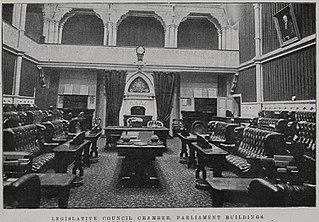Responsible government is a conception of a system of government that embodies the principle of parliamentary accountability, the foundation of the Westminster system of parliamentary democracy. Governments in Westminster democracies are responsible to parliament rather than to the monarch, or, in a colonial context, to the imperial government, and in a republican context, to the president, either in full or in part. If the parliament is bicameral, then the government is usually responsible first to the parliament's lower house, which is more representative than the upper house, as it usually has more members and they are always directly elected.

The Westminster system, or Westminster model, is a type of parliamentary government that incorporates a series of procedures for operating a legislature, first developed in England. Key aspects of the system include an executive branch made up of members of the legislature, and that is responsible to the legislature; the presence of parliamentary opposition parties; and a ceremonial head of state who is separate from the head of government. The term derives from the Palace of Westminster, which has been the seat of the Westminster Parliament in England and later the United Kingdom since the 13th century. The Westminster system is often contrasted with the presidential system that originated in the United States, or with the semi-presidential system, based on the government of France.

The Politics of Yemen are in an uncertain state due to the Houthi takeover in Yemen. An armed group known as the Houthis or Ansar Allah seized control of the Northern Yemeni government and announced it would dissolve parliament, as well as install a "presidential council", "transitional national council", and "supreme revolutionary council" to govern the country for an interim period. However, the deposed president, Abdrabbuh Mansur Hadi, has declared he is still in office and is working to establish a rival government in Aden.

A member of parliament (MP) is the representative in parliament of the people who live in their electoral district. In many countries with bicameral parliaments, this term refers only to members of the lower house since upper house members often have a different title. The terms congressman/congresswoman or deputy are equivalent terms used in other jurisdictions. The term parliamentarian is also sometimes used for members of parliament, but this may also be used to refer to unelected government officials with specific roles in a parliament and other expert advisers on parliamentary procedure such as the Senate parliamentarian in the United States. The term is also used to the characteristic of performing the duties of a member of a legislature, for example: "The two party leaders often disagreed on issues, but both were excellent parliamentarians and cooperated to get many good things done."
The Commonwealth Parliamentary Association (CPA), previously known as the Empire Parliamentary Association, is an organisation which works to support good governance, democracy and human rights.

The Federation of South Arabia was a federal state under British protection in what would become South Yemen. Its capital was Aden.

The New Zealand Legislative Council was the upper house of the General Assembly of New Zealand between 1853 and 1951. An earlier arrangement of legislative councils for the colony and provinces existed from 1841 when New Zealand became a colony; it was reconstituted as the upper house of a bicameral legislature when New Zealand became self-governing in 1852, which came into effect in the following year.

The Legislative Council of Fiji was the colonial precursor to the present-day Parliament, which came into existence when Fiji became independent on 10 October 1970.

The Parliament of Barbados is the national legislature of Barbados. It is accorded legislative supremacy by Chapter V of the Constitution of Barbados. The Parliament is bicameral in composition and is formally made up of two houses, an appointed Senate and an elected House of Assembly, as well as the President of Barbados who is indirectly elected by both. Both houses sit in separate chambers in the Parliament Buildings, in the national capital Bridgetown in Saint Michael.

Aden Colony, also the Colony of Aden, located in the south of contemporary Yemen, was a crown colony of the United Kingdom from 1937 to 1963. It consisted of the port of Aden and its immediate surroundings.

The National Assembly is the sole legislative body of Botswana's unicameral Parliament, of which consists of the President and the National Assembly. The House passes laws, provides ministers to form Cabinet, and supervises the work of government. It is also responsible for adopting the country's budgets. It is advised by the Ntlo ya Dikgosi, a council of tribal chiefs which is not a house of Parliament.

The unicameral National Assembly is the Seychelles's legislative body.

The modern history of Yemen began with the withdrawal of the Ottoman Empire. In 1839 the British set up a protective area around the southern port of Aden and in 1918 the northern Kingdom of Yemen gained independence from the Ottoman Empire. North Yemen became a republic in 1962, but it was not until 1967 that the British Empire withdrew from what became South Yemen. In 1970, the southern government adopted a communist governmental system. The two countries were officially united as the Republic of Yemen on May 22, 1990.

Speaker of the House of Representatives of Antigua and Barbuda is the presiding officer in the House of Representatives of Antigua and Barbuda. Prior to conducting any other business, the House must elect a Speaker at its first session following a general election. If the position of Speaker becomes vacant at any point before the next dissolution of Parliament, the House must elect a replacement as soon as is practically possible. The Speaker may be chosen from among House members or from among individuals who are not House members but are eligible to serve in that capacity. Before conducting any other business other than electing the Speaker during the first meeting following a general election, the House shall elect a member to serve as Deputy Speaker. If the position of Deputy Speaker becomes vacant at any point prior to the next dissolution of Parliament, the House shall, as soon as is practically possible, elect another member to fill the vacancy. A minister or parliamentarian cannot be elected as the speaker or deputy speaker of the house by the house. When the position of Speaker is open, the House may not conduct any business.

The Speaker of the House of Assembly of Dominica is responsible for the management and general administration of the House, ensuring that rules of procedure are followed. The Speaker is elected by the House of Assembly at its first sitting after a general election.
The 1966 Dissolution Honours List was issued on 19 May 1966 following the dissolution of the United Kingdom parliament in preparation for a general election.

The House of Assembly of Kiribati has a Speaker, a function adapted from the British Westminster model. The position was established in 1979 by article 71 of the Constitution, when the country became independent from the United Kingdom. It replaced the Speaker of the former House of Representatives existing since 1967, then known as Legislative Council in 1970 and House of Assembly since 1974.
The following is a timeline of the history of the city of Aden, Yemen.
Samuel Antwi Kwaku Bonsu, also known by the name Solomon Antwi Kwaku Bonsu, was a Ghanaian politician in the first republic. He was the Minister of Co-operatives and later Minister of Pensions and National Insurance. He was also the member of parliament for the Sekyere West constituency from 1959 to 1965 and the member of parliament for the Adotobri constituency from 1965 to 1966.
The Legislative Council of Swaziland was the legislative body of Swaziland Protectorate from 1964 to 1967.















